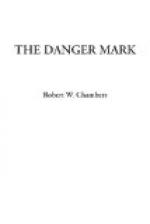But he was going to one of them now. He needed something to kill that vichy; he’d have one more honest drink in spite of all the Old Squills and Mulqueens in North America!
At the Cataract Club there were three fashion-haunting young men drinking hot Scotches: Dumont, his empurpled skin distended with whiskey and late suppers, and all his former brilliancy and wit cankered and rotten with it, and his slim figure and clean-cut face fattened and flabby with it; Myron Kelter, thin, elegant, exaggerated, talking eternally about women and his successes with the frailer ones—Myron Kelter, son of a gentleman, eking out his meagre income by fetching, carrying, pandering to the rich, who were too fastidious to do what they paid him for doing in their behalf; and the third, Forbes Winton, literary dilettante, large in every feature and in waistcoat and in gesture—large, hard, smooth—very smooth, and worth too many millions to be contradicted when misstating facts to suit the colour of his too luxuriant imagination.
These greeted Quest in their several and fashionably wearied manners, inviting his soul to loaf.
Later he had a slight dispute with Winton, who surveyed him coldly, and insolently repeated his former misstatement of a notorious fact.
“What rot!” said Quest; “I leave it to you, Kelter; am I right or not?”
Kelter began a soft and soothing discourse which led nowhere at first but ended finally in a re-order for four hot Scotches.
Then Dumont’s witty French blood—or the muddied dregs which were left of it—began to be perversely amusing at Quest’s expense. Epigrams slightly frayed, a jest or two a trifle stale, humorous inversions of well-known maxims, a biting retort, the originality of which was not entirely free from suspicion, were his contributions to the festivities.
Later Kelter’s nicely modulated voice and almost affectionate manner restrained Quest from hurling his glass at the inflamed countenance of Mr. Dumont. But it did not prevent him from leaving the room in a vicious temper, and, ultimately, the Cataract Club.
The early winter night had turned cold and clear; sidewalks glittered, sheeted with ice. He inhaled a deep breath and expelled a reeking one, hailed a cab, and drove to the railroad station.
Here he bought his tickets, choosing a midnight train; for the journey to Mulqueen’s was not a very long one; he could sleep till seven in the car; and, besides, he had his luggage to collect from the hotel he had been casually inhabiting. Also he had not yet dined.
Bodily he felt better, now that the vichy had been “killed”; mentally his temper became more vicious than ever as he thought of Dumont’s blunted wit at his expense—a wit with edge enough left to make a ragged, nasty wound.
“He’ll get what’s coming to him some day,” snarled Quest, returning to his cab; and he bade the driver take him to the Amphitheatre, a restaurant resort, wonderful in terra-cotta rocks, papier-mache grottos, and Croton waterfalls—haunted of certain semi-distinguished pushers of polite professions, among whom he had been known for years.




